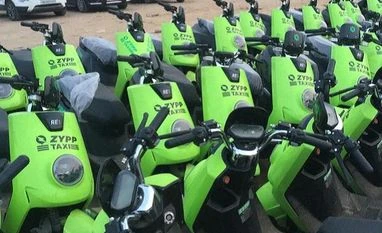Despite the possibility of lost profits and at least a couple of missed quarters, owing to the virus spread, there are instances of bright sparks emerging. These are in the form of innovative companies that look to tweak business models and rev up new services.
Among the emeging firms is Gurugram-based Zypp, an electric scooter rental app, which will start to deliver its bikes to retail consumers – with a unique add-on: A sanitary wash-down in front of the customer at the time of delivery.
“As the work from home lifestyle becomes a norm, many young employees, that include millennials, may not have access to cabs. If there’s an urgent need to go to a medical store or hospital, they may be in a bit of a spot,” said Akash Gupta, co-founder of Zypp. “That’s where our e-scooters come in. The added feature is that an individual may not want to use a cab or a car in which an infected person may have earlier sat.”
Zypp, founded in 2017, is available on weekly or monthly subscription basis. The prices range between Rs 650 a week and Rs 950, depending on the model. Zypp e-scooter ranges from 55 km to 70 km on a single charge.
“It’s greener but also definitely cleaner than a cab which folks may have used before you,” said Gupta. Zypp received total funding of $3 million from IAN Fund, a venture capital fund. IAN Fund backed-Zypp operates over 1,000 vehicles currently. Zypp also leverages a crowdfunding model, whereby it raises money from investors to lease vehicles in exchange for interest payouts and a buyback condition at the end of a pre-determined tenure.
Like Zypp, Bike-taxi unicorn, Rapido is providing customers with mandatory half-helmets as opposed to full-face helmets. The riders (captains) are also asked to maintain personal hygiene and clean the pillion seat before onboarding customers in addition to wearing a mask at all times.
The bike-taxi is a more open and personalised way for intracity travel. This is opposed to other crowded alternative ways like cabs, buses and trains, where the customer has an advantage of less exposure to any infection due to his/her limited interaction with the captain, said company officials.
Bengaluru-based Rapido is present in over 90 cities with 500,000 partners catering to 10 million customers.
Bengaluru-based start-up Dunzo already runs delivery services for customers but is contemplating more stringent “no contact delivery” methods that leverage a sanitized approach.
Sandeep Murthy, co-founder of Lightbox, which funds Dunzo, says deliveries include safety gear and a new insurance policy that covers workers for the virus and related expenses as well as guaranteed pay.
“We’re also exploring the possibility of using aircraft aerosol-style sprays to disinfect goods and packages but that is an early stage plan,” Murthy said.
Digital payments company PhonePe already has a service on its platform called ‘Pay at Stores’ that allows consumers to find nearby ‘kiranas’ or shops, buy groceries, get them delivered and pay remotely. According to sources, they are seeing a huge uptick for groceries and medicines as people avoid supermarkets and malls due to the coronavirus (Covid-19) outbreak. The feature allows consumers to explore multiple grocery and medical stores in the vicinity, compared to just one or two most frequently used kiranas.
“Sometimes the grocery store next to your home is shut and you are looking for the next best option. The new PhonePe feature shows what time the store opens and closes and provides access to phone numbers of the store,” said a person familiar with the development.
PhonePe competes with rivals such as Paytm, Google Pay as well as Amazon Pay and is accepted as a payment option at 10 million outlets across 350 cities in India. It has 200 million registered users and does 570 million monthly transactions. The company witnessed annualised total payments value (TPV) of $180 billion and has 10 million merchants.
Not surprisingly, the grocery category spiked by 115 per cent in recent weeks as people are stocking up on supplies.
According to sources, online grocery firm Grofers, which last year raised $220 million from investors that include SoftBank, will offer a credit feature soon to consumers with low income to enable them to also buy groceries.
Online grocery player Bigbasket, is in the process of implementing a ‘no-touch’ option, where products can be left at the doorsteps of customers. Bengaluru-based Bigbasket’s officials said it was ensuring the safety of customers as well as delivery executives and making sure its employees wear disposable gloves and masks while the grocery crates are wiped regularly.
Ashish Chaturvedi, founder of uFony Services, which works with over 700 schools in nine countries, has a platform called ‘School Diary’. It helps schools engage with parents and provide their content such as videos, pictures and other information to students.
“Due to demand from schools, we have come up with a video-conferencing feature from our platform for the schools (to engage with students). This, we would be scaling up to other countries,” said Chaturvedi. “It is cheaper than other video conferencing platforms such as Zoom.”
Delivery executives and driver partners are the more active workers during these testing times. Home security tech company MyGate has come up with a ‘Leave at Gate’ feature to enable zero-touch parcel management to ensure contactless deliveries.
Once the parcel arrives at the gate, the user is given the option to either allow entry, deny entry or leave it at the gate.
On choosing leave at gate, the user can collect the parcel by sharing a six-digit code with the guard, reducing the risk of any outside contact.
)

)

















